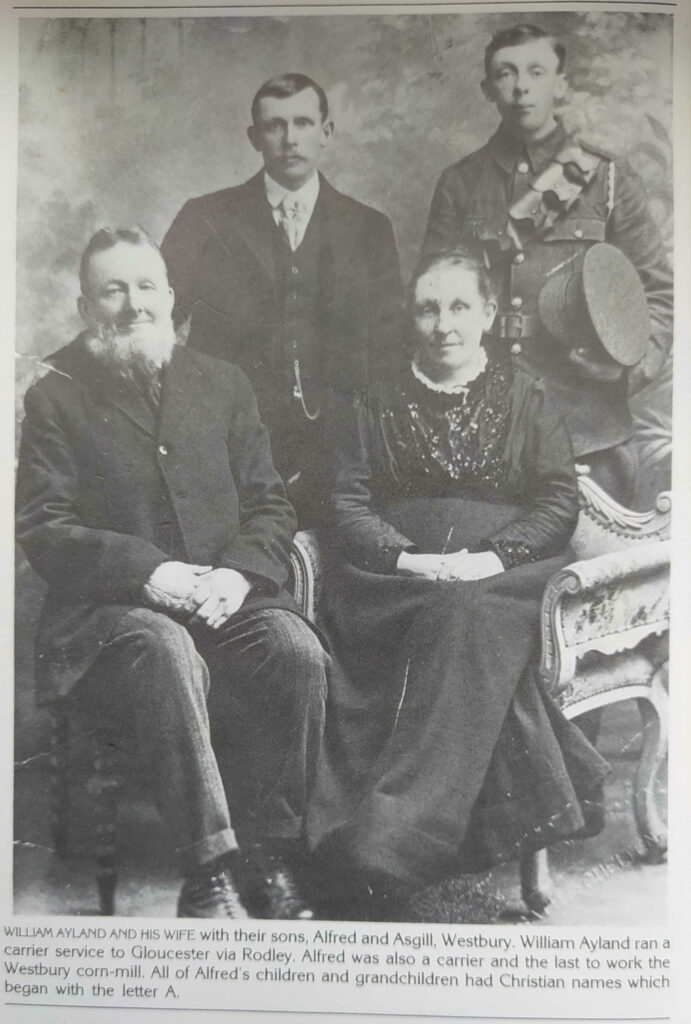William Ayland (1854 – 1934) was born in Westbury-on-Severn and lived in the parish all his life. He was the son of Job Ayland who was a carpenter and wheelwright. Westbury-on-Severn is a large parish, six miles across and the main industry is agriculture. As William grew up, he got to know all the roads and footpaths and became personally acquainted with most of the inhabitants of the parish.

William attended the Broad Oak Wesleyan Chapel where he became a teacher at its Sunday School. He married Elizabeth Grindon in 1878 and they went on to have five children. He was a long-serving member of the Manchester Unity of Oddfellows (Gloucester District) Friendly Society and eventually filled all the posts on its committee
On leaving school William started work at the Bullo Pill Wagon Works. Kelly’s directory for 1879 lists William as working as a farm bailiff for W Symes. The 1881 census lists him as working as an agricultural labourer. Later in the 1880s, he established a business transporting coal and other goods to Gloucester with a horse and van. However, in 1911, the census lists him as working as a general labourer.
All his life William sought to represent the interests of the poor in his parish and believed this could be achieved by ‘working men’ having representatives in local and national government. Consequently, as a young man, he became interested in politics and joined the Liberal Party.
However, up to 1894 in parish elections, councillors were elected by a system of weighted voting, with those owning more property having multiple votes. For instance, a cottager had just one vote while a farmer might have six (if he owned his farm, twelve). On the passing of the Local Government Act (1894) by the Liberal government, the multiple-vote system was abolished and the Parish of Westbury became an Urban District with a Council of twelve, elected every three years (one-third of the council was elected in April each year). To be eligible for election, a candidate was required to be on the electoral register and to have resided in the district for twelve months before the election. Women were permitted to be councillors.
These reforms meant that it was now more likely working-class people could be elected to roles in local government. At the election of the first Council in December 1894, William was at the top of the poll.[1] He was then able to use his position to challenge the interests of the wealthy landowners in the parish. In his obituary in December 1934 the Gloucester Journal reported:
On the Urban Council, one of his special cares was the footpath. It must be remembered that though the district was called urban it was a thinly populated agricultural area. The farmer could drive his horse and cart, but others had to walk and woe betide the farmer who put barbed wire across a path or stile that was difficult to climb.[2]
Also in 1894, he was elected onto the Boards of the Westbury Board of Guardians to administer the Poor Law. The Gloucester Journal obituary goes on to say:
He was a guardian of the poor and not of the Poor Law. His intimate knowledge of the entire population of poor folk would influence this. Nobody got any relief unless they applied, but doubtless many applications were due to William’s prompting.[3]
In 1918, he became disillusioned with the Liberal Party and their capacity to represent working-class interests and so he joined the Labour Party. He also joined the Workers Union which was a general union. During the 1910s, it was the largest general union in the UK and successfully recruited agricultural and industrial workers. However, the Workers Union entered a rapid decline in the 1920s and eventually became part of the Transport and General Workers’ Union.
During the 1926 miners’ lockout, William combined with other Labour Guardians to try and challenge the majority on the Board who were hostile to the miners. In August 1926, despite opposition from Labour members, the Board decided to cut off all relief to the destitute wives and children of the locked-out men. This was only the second Board to cut off relief to the mining community and contrasted with most other districts where miners’ dependents continued to receive support.
Boards of Guardians were abolished in 1930 by the Local Government Act 1929, when their powers and responsibilities passed to local and national government bodies, including public assistance committees. William continued in his role as a local councillor until just before his death in 1934.
The Gloucester Journal ends William’s obituary with this:
In an agricultural district it was a kind of social impertinence for a “working man” to want to fill a public office. Against this particular ideal, William trailed his coat. He lived to a good old age and did his job.
[1] South Wales Daily News 20 December 1894.
[2] Gloucester Journal 22 December 1934.
[3] Gloucester Journal 22 December 1934.